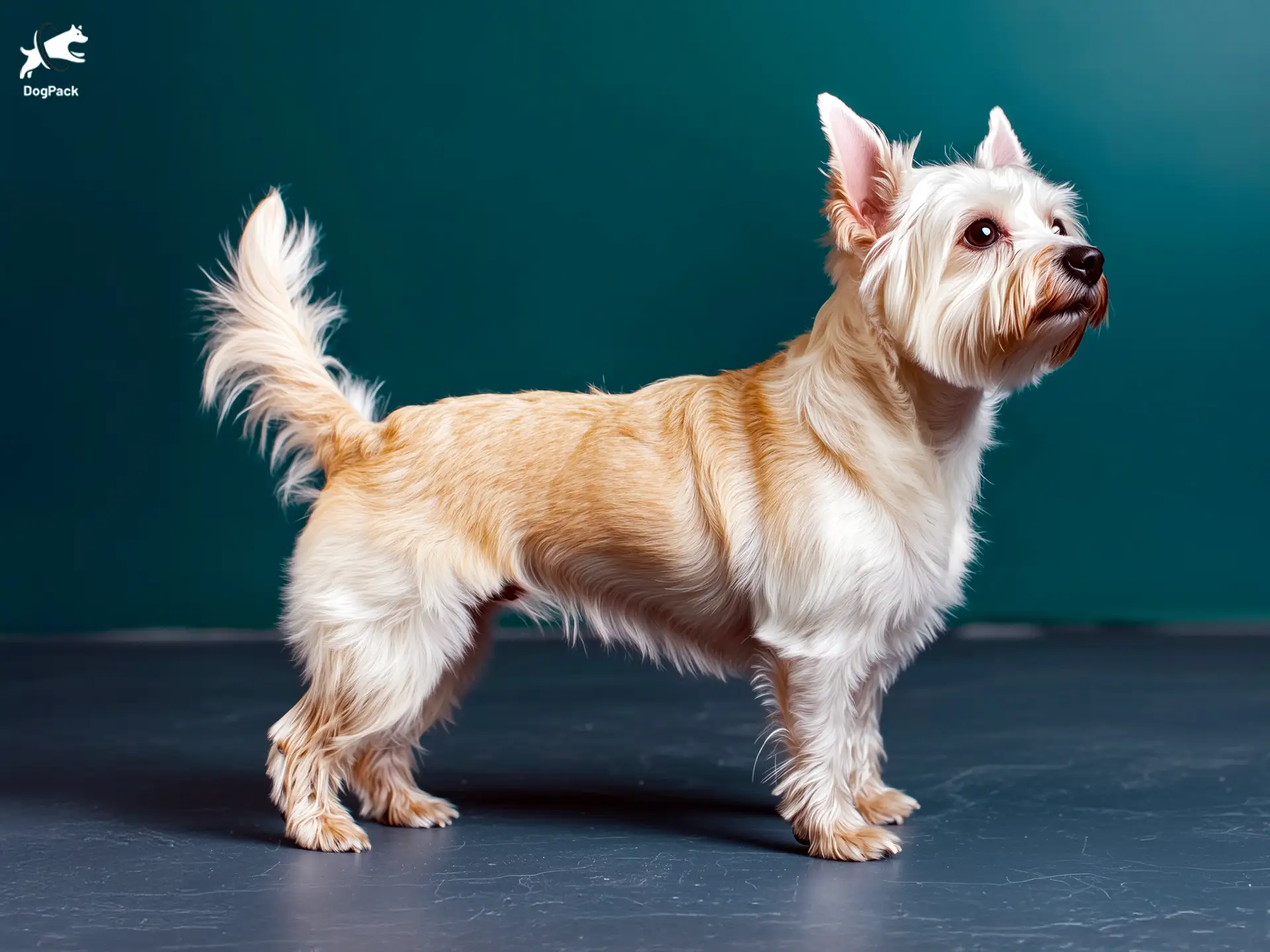Weshi Dog Breed Info & Overview
Picture an adorable pint-sized pup with a dash of spunk and a face that demands cuddles—that’s the Weshi in a nutshell. A cross between the West Highland White Terrier and the Shih Tzu, this dog offers the best of both worlds: playful spirit and unwavering loyalty. The Weshi is perfect for apartment dwellers seeking a devoted little companion.
Characteristics
Pictures
Breed History
Weshi origins are tied to the growing popularity of designer dogs in the late 20th century. Breeders sought to combine the friendly, outgoing nature of the Shih Tzu with the feisty yet affectionate West Highland White Terrier. While there’s no single official record pinpointing the exact date of this mix’s debut, enthusiasts agree it gained momentum as a beloved companion for those craving a small but spirited pup.
Shih Tzus boast an ancient heritage linked to Chinese nobility, while Westies hail from Scotland, where they were prized for their vermin-hunting prowess. Blending these two lineages created a hybrid with a regal flair and terrier tenacity—truly the best of both worlds. Early Weshi fans praised their dog’s bright disposition, which quickly cemented this mix’s reputation as a lively family pet.
Although not officially recognized by the major kennel clubs, the Weshi has carved out its own niche among small dog breeds lovers. Their initial appeal stemmed from a unique look—a fluffy coat paired with a proud stance—and an all-around lovable temperament. Over time, word of mouth and enthusiastic owners helped the Weshi become a sought-after companion in urban and suburban households alike.
Temperament, Personality
This spirited cross is known for being outgoing and confident around those it trusts. Owners often find that socializing a young pup leads to a Weshi who’s great with kids and receptive to making new friends at the dog park. Curious and attentive, they love following their people from room to room, always ready to offer a wagging tail and a comforting presence.
They’re not total pushovers, though. Terriers can have a stubborn streak, and this hybrid inherits a bit of that independent mindset. If they sense hesitation, they might try to call the shots, especially when it comes to cuddle time or snagging a favorite seat on the couch. Yet, with consistent boundaries, they’ll eagerly settle into the role of a faithful, well-mannered companion.
Sociable by nature, the Weshi usually does well in multi-pet homes, though early introductions are essential. Their Shih Tzu heritage craves close contact with humans, while the Westie side brings a dash of spirited playfulness. Many owners describe them as “small dogs with big personalities,” brightening the mood wherever they go. A friendly greeting is almost guaranteed when guests step through the door.
Physical Characteristics
This cross typically sports a compact frame, standing under a foot tall yet radiating a sturdy, balanced appearance. A hallmark is that cute, often slightly upturned snout—part Shih Tzu, part Westie, and all charm. Their expressive eyes sit behind a fringed face, making many folks instantly fall for their sweet, teddy bear-like vibe.
Coat-wise, they can range from soft and silky to somewhat coarse, depending on genetic influence. Coloring varies widely: some Weshis are predominantly white, like their Westie relatives, while others inherit darker shades or classic Shih Tzu patterns. Regardless of hue, the coat typically has a gentle wave, lending a plush appearance that begs for belly rubs.
Despite weighing only about 12 to 18 pounds, these pups carry themselves with the dignity of a much larger dog. They have a moderate bone structure, and their tail can curl slightly over the back, hinting at Shih Tzu ancestry. Overall, the Weshi’s proportions and coat type make them a prime choice for those seeking a small yet robust canine buddy.
Health Issues
As with any crossbreed, certain genetic predispositions can pop up, but many Weshis enjoy relatively robust health. That said, watch for issues like patellar luxation—a condition where the kneecap can dislocate—and potential skin sensitivities inherited from the Westie side. Early vet checkups and preventive care go a long way in catching these conditions before they become serious.
Shih Tzu lineage brings the possibility of brachycephalic traits, though not as pronounced as in pure Shih Tzus. Keep an eye on your pup for signs of respiratory discomfort, especially in hot or humid weather. In addition, regularly cleaning their ears can help ward off infections, which small, floppy-eared breeds sometimes face.
Routine wellness exams and a balanced lifestyle remain the best strategies for long-term vitality. Monitoring weight is crucial—given their compact size, a few extra pounds can strain joints and compound respiratory issues. Vet-approved diets and moderate exercise help keep a Weshi fit and thriving, ensuring a happy, playful companion for many years.
Grooming Needs
Weshis typically have a moderately long, fluffy coat that requires consistent maintenance to prevent matting. Plan on brushing at least three times a week, particularly around the ears and belly, where tangles can form. A slicker brush and a comb that can reach the undercoat are essential tools in your grooming arsenal.
Scheduling a trim every six to eight weeks is common, especially if your pup’s hair grows faster than you can comfortably maintain. Depending on how much your Weshi inherits the Shih Tzu’s coat, you may opt for a “puppy cut,” which is both adorable and easy to manage. Keeping the hair around the eyes neatly trimmed prevents irritation and tear stains.
Bathing once a month—or as needed when they get into mischief—helps keep their coat soft and free of doggy odors. Gentle shampoos formulated for dog breeds with sensitive skin are a good choice. Don’t forget regular nail trims, as overgrown nails can be uncomfortable. Paired with ear checks and teeth cleaning, a steady grooming routine keeps this pup looking sharp and feeling great.
Exercise Requirements
Although small, these pups thrive on regular activity. Think brisk walks around the neighborhood or a fun backyard romp—anything that allows them to sniff around and burn off their curiosity. Short bursts of play multiple times a day can keep a Weshi content without overexertion. Remember, they’re not marathon runners, so gentle, consistent exercise fits best.
Interactive toys, like puzzle feeders or treat-dispensing balls, can keep their minds busy when you’re short on time for a walk. Since both Westies and Shih Tzus are bright, your hybrid might enjoy a lively chase after a squeaky toy. Introducing occasional agility-based games—like hopping through a low hoop—can channel that extra spark in a focused way.
Outdoor adventures should be balanced with caution in extreme weather. Shih Tzu roots mean some Weshis might be sensitive to overheating, while the Westie side is game for cooler climates. A 30- to 45-minute daily total of exercise, spread across walks and playtime, generally keeps them happy. Always adapt to your dog’s individual energy level—some will bounce around for hours, while others prefer a cozier routine.
Training Tips
A mix of cheerleader-like praise and gentle persistence works best. Treat-based training often wins a Weshi’s heart, but don’t go overboard with the snacks—this breed can be prone to weight gain if overindulged. Short, upbeat sessions keep them engaged, as lengthy drills can bore them into stubbornness.
Patience is key when tackling commands like “sit” or “stay.” While generally bright, a Weshi might test boundaries if they sense inconsistency. You’ll benefit from using clear verbal cues paired with rewarding gestures. If they inherit more of the Westie’s tenacity, you might need to reinforce commands repeatedly, always with positive reinforcement rather than harsh discipline.
Socialization from puppyhood sets them up for success. Introduce them to people of all ages, other canines, and even cat companions if you have them. This helps reduce any territorial tendencies that some terriers are known for. Early exposure also curbs potential barking at unfamiliar noises or visitors. Consistent, friendly guidance paves the way for a polite, well-rounded companion who’s a joy to be around.
Nutrition, Diet
Because these pups weigh between 12 and 18 pounds, a Weshi typically does well on about ¾ to 1 cup of high-quality dog food per day, divided into two meals. Look for a formula specifically balanced for small breeds, with moderate protein and fat to maintain a healthy weight. Avoid generic diets—some small dogs need a bit more tailored nutrition to thrive.
If your dog leans toward the Shih Tzu side, keep an eye on portion control, as smaller frames can pack on pounds quickly. For example, if your pup is especially active, you might offer slightly more daily calories, but always check with your vet for personalized guidance. Try to avoid too many starchy treats or table scraps that can upset their nutrient balance.
Occasional tasty extras like boiled chicken bits or carrot slices can be used for training rewards. However, limit high-calorie commercial treats to ensure your Weshi’s waistline stays trim. Including Omega-3–rich food sources or supplements can help keep skin and coat healthy, vital for a mix prone to potential allergies. Above all, consistency is crucial: keep mealtimes and portion sizes steady for a happy, well-fed companion.
Adoption, Breeders
If you’re seeking a Weshi, rescue groups or local shelters might have this mix waiting for a forever home. Some specialized organizations, such as Petfinder or Adopt-a-Pet, let you search specifically for Westie-Shih Tzu blends. Adopting is a wonderful way to give a pup a second chance, and you’ll often find older dogs who are already house-trained.
For those determined to start with a puppy, focus on reputable breeders who prioritize the health of both parent dogs. Look for thorough vet records, transparent breeding practices, and opportunities to meet the puppy’s mother. Ethical breeding helps ensure your new family member arrives free of major health concerns and well socialized, smoothing the transition to their new home.
Avoid breeders who won’t answer questions about medical screenings or early puppy care. A reliable source might even provide references or let you speak with previous buyers. Don’t forget to consider the ongoing expenses—vaccinations, grooming sessions, and routine checkups all add up. If everything checks out, this small, playful companion can make a fantastic addition to almost any household.
Family Pet?
The compact yet lively personality of this mix typically thrives in a family setting. They bond quickly with children who know how to respect a dog’s space and can match their playful energy. A Weshi loves being involved in group activities—think quick backyard games of fetch or cozy movie nights where they can snuggle up and soak in the attention.
Because of their moderate size, they’re a safer choice for families with slightly older kids who’ve learned gentle handling. While not as fragile as some smaller breeds, they still appreciate a calm environment free from rough play. These pups often see themselves as an integral part of the family, happily settling into any bonding time—especially if it involves belly rubs.
They also adapt well to a household with other pets, provided introductions are made slowly. A gentle, laid-back cat is unlikely to ruffle a confident Weshi, and an older dog might enjoy a new friend. Overall, their friendly temperament and desire for human interaction shine brightest when surrounded by loving, attentive family members ready to dote on them.
Right For You?
Not everyone can handle the grooming routine or occasional stubborn streak of this delightful hybrid. If you’re someone who appreciates a small companion with big personality—and you have the time for consistent brushing and moderate activity—a Weshi might be your perfect match. City dwellers or suburban families alike can appreciate their affectionate spirit in a relatively compact package.
However, if you travel often or prefer a low-maintenance breed with minimal grooming needs, this pup’s coat care could become a hassle. Also, any reluctance to establish firm but loving boundaries might encourage those terrier impulses to take over. When weighing the pros and cons, remember they flourish in environments where they can be part of the daily routine and showered with plenty of affection.
Ultimately, this mix suits owners who enjoy a dash of spunk balanced by sweet devotion. They’re an excellent choice for households where someone can keep them company for most of the day. If that describes your lifestyle, you’ll likely find a loyal friend in this pint-sized package—ready to charm you with an eager tail wag the moment you walk through the door.
Conclusion
When considering a playful, affectionate companion that stays conveniently small, the Weshi often rises to the top of the list. Their mix of Westie tenacity and Shih Tzu sweetness makes for a delightful housemate that adapts well to both urban apartments and sprawling homes. If you’re seeking a spirited dog who fits snugly into family life yet still exhibits a big personality, this hybrid could be your ideal match. Share your own Weshi stories or adoption experiences with fellow dog lovers, and enjoy welcoming this cheerful pup into your home!
FAQs
-
How does the Weshi’s temperament compare to its parent breeds?
The Weshi inherits the West Highland White Terrier’s boldness and the Shih Tzu’s affectionate nature. This mix results in a confident yet loving companion that enjoys social interactions but may also have a touch of independence from its Terrier lineage.
-
Do Weshis have a high prey drive like Westies?
Unlike the West Highland White Terrier, which has a strong prey drive, the Weshi tends to be more moderate in chasing small animals. However, early training and socialization are recommended to prevent excessive chasing of squirrels or smaller pets.
-
How does the Weshi handle being left alone?
Weshis are prone to separation anxiety due to their Shih Tzu heritage, which makes them deeply attached to their owners. If left alone for long periods, they may develop destructive habits or excessive barking. Training and interactive toys can help ease their anxiety.
-
Does the Weshi’s coat require more care than a purebred Westie or Shih Tzu?
Yes, the Weshi’s coat is often a mix of soft waves or curls, requiring more frequent grooming than a Westie’s but slightly less than a full-coated Shih Tzu. Brushing every other day prevents matting and keeps the coat looking neat.
-
Are Weshis suitable for first-time dog owners?
Yes! The Weshi’s friendly nature and adaptability make it a great choice for first-time dog owners. However, owners should be prepared for regular grooming, moderate training needs, and a playful yet stubborn personality that requires patient reinforcement.
Breed Ratings
Bright and responsive, but may need gentle repetition due to occasional stubbornness.
Enjoys games and interacting with family members, always ready for fun.
Moderate bursts of activity mixed with plenty of downtime.
Low shedding, but regular grooming is needed to prevent matting.
Some terrier instincts persist, so small critters can pique curiosity.
Brushing and regular trims are necessary, but manageable with consistency.
Willing to learn, though a bit of stubbornness can require extra patience.
Prefers human company; may get anxious if left for long periods.
Vocal at times, especially when excited or alerting.
Rarely drools, making them a neat indoor companion.
Generally sociable with other dogs when socialized early.
Overall hardy; watch for minor breed-specific issues like patellar luxation.













